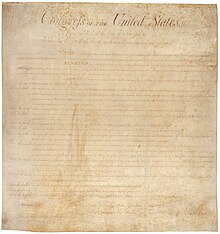Bill of rights


A bill of rights, sometimes called a declaration of rights or a charter of rights, is a list of the most important rights to the citizens of a country. The purpose is to protect those rights against infringement from public officials and private citizens. The term "bill of rights" originates from England, where it refers to the Bill of Rights 1689 enacted by Parliament following the Glorious Revolution, asserting the supremacy of Parliament over the monarch, and listing a number of fundamental rights and liberties.
Bills of rights may be entrenched or unentrenched. An entrenched bill of rights cannot be modified or repealed by a country's legislature through normal procedure, instead requiring a supermajority or referendum; often it is part of a country's constitution and therefore subject to special procedures applicable to constitutional amendments. A not entrenched bill of rights is a normal statute law and as such can be modified or repealed by the legislature at will.
In practice, not every jurisdiction enforces the protection of the rights articulated in its bill of rights.
List of bills of rights

General
- Magna Carta (1215; England)
- Golden Bull of 1222 (1222; Hungary)
- Statute of Kalisz (1264; Kingdom of Poland) Jewish residents' rights
- Dušan's Code (1349; Serbia)
- Twelve Articles (1525; Germany)
- Pacta conventa (1573; Poland)
- Henrician Articles (1573; Poland)
- Petition of Right (1628; England)
- Bill of Rights 1689 (England) and Claim of Right Act 1689 (Scotland) This applied to all British Colonies of the time, and was later entrenched in the laws of those colonies that became nations - for instance in Australia with the Colonial Laws Validity Act 1865 and reconfirmed by the Statute of Westminster 1931
- Virginia Declaration of Rights (June 1776)
- Preamble to the United States Declaration of Independence (July 1776)
- Declaration of the Rights of Man and of the Citizen (1789; France)
- Bill of Rights of the United States Constitution (completed in 1789, ratified in 1791)
- Declaration of the Rights of the People (1811; Venezuela)
- Article I of the Constitution of Connecticut (1818)
- Constitution of Greece (1822; Epidaurus)
- Hatt-ı Hümayun (1856; Ottoman Empire)
- Article I of the Constitution of Texas (1875)
- Basic rights and liberties in Finland (1919)[citation needed]
- Articles 13-28 of the Constitution of Italy (1947)
- Universal Declaration of Human Rights (1948, United Nations)
- Fundamental rights and duties of citizens in People's Republic of China (1949)
- European Convention on Human Rights (1950)
- Fundamental Rights of Indian citizens (1950)
- Implied Bill of Rights (a theory in Canadian constitutional law)
- Canadian Bill of Rights (1960)
- Canadian Charter of Rights and Freedoms (1982)
- Article III of the Constitution of the Philippines (1987)
- Article 5 of the Constitution of Brazil (1988)
- New Zealand Bill of Rights Act (1990)
- Charter of Fundamental Rights and Basic Freedoms of the Czech Republic (1991)
- Hong Kong Bill of Rights Ordinance (1991)
- Chapter 2 of the Constitution of South Africa (entitled "Bill of Rights") (1996)
- Human Rights Act 1998 (United Kingdom)
- Human Rights Act 2004 (Australian Capital Territory)
- Charter of Fundamental Rights of the European Union (2005)
- Victorian Charter of Human Rights and Responsibilities (2006; Australian state of Victoria)
- Chapter Four of the Constitution of Zimbabwe (2013)
Specifically targeted documents
- Consumer Bill of Rights
- Homeless Bill of Rights
- Taxpayer Bill of Rights
- Academic Bill of Rights, for students
- Veterans' Bill of Rights
- G.I. Bill of Rights, better known as the G.I. Bill
- Homosexual Bill of Rights, drafted by North American Conference of Homophile Organizations
- Library Bill of Rights, published by the American Library Association
- Environmental Bill of Rights
- Gamer's Bill of Rights, for video gamers
- Creator's Bill of Rights, comic writers and artists
- Donor's Bill of Rights, for philanthropic donors
- Law Enforcement Officers' Bill of Rights
- California Voter Bill of Rights, adaptation of the Voting Rights Act
- Islamic Bill of Rights for Women in the Mosque
- New Jersey Anti-Bullying Bill of Rights Act
- Credit Cardholders' Bill of Rights, contained within the Credit CARD Act of 2009
- Passengers' Bill of Rights
- Clone Bill of Rights, promoted by Randy Wicker's Clone Rights United Front for human cloning
Exceptions in Western democracies
Australia is the only Western democratic country with neither a constitutional nor federal legislative bill of rights to protect its citizens, although there is ongoing debate in many of Australia's states.[1][2] In 1973, Federal Attorney-General Lionel Murphy introduced a human rights Bill into parliament, although it was never passed.[3] In 1984, Senator Stephen Bunce drafted a Bill of Rights, but it was never introduced into parliament, and in 1985, Senator Lionel Bowen introduced a bill of rights, which was passed by the House of Representatives, but failed to pass the Senate.[4] Former Australian Prime Minister John Howard has argued against a bill of rights for Australia as transferring power from elected politicians (populist politics) to unelected (Constitutional) judges and bureaucrats.[5][6] Victoria and the Australian Capital Territory (ACT) are the only states and territories to have a human rights Act.
See also
- Proposed British Bill of Rights
- Inalienable rights
- International Bill of Human Rights
- International human rights instruments
- Natural rights
- Rule of law
- Second Bill of Rights
References
This article needs additional citations for verification. (January 2011) |
- ^ http://www.wesleymission.org.au/archives/suter/080718.asp
- ^ Anderson, Deb (21 September 2010). "Does Australia need a bill of rights?". The Age. Melbourne.
- ^ http://www.ag.gov.au/RightsAndProtections/HumanRights/TreatyBodyReporting/Documents/NHRCR-Billofrightsdebatesahistoricaloverview.pdf
- ^ http://www.ag.gov.au/RightsAndProtections/HumanRights/TreatyBodyReporting/Documents/NHRCR-Billofrightsdebatesahistoricaloverview.pdf
- ^ "Howard opposes Bill of Rights". PerthNow. The Sunday Times. 2009-08-27. Retrieved 2009-09-14.
- ^ Howard, John (2009-08-27). "2009 Menzies Lecture by John Howard (full text)". The Australian. News Limited. Retrieved 2009-09-14.
